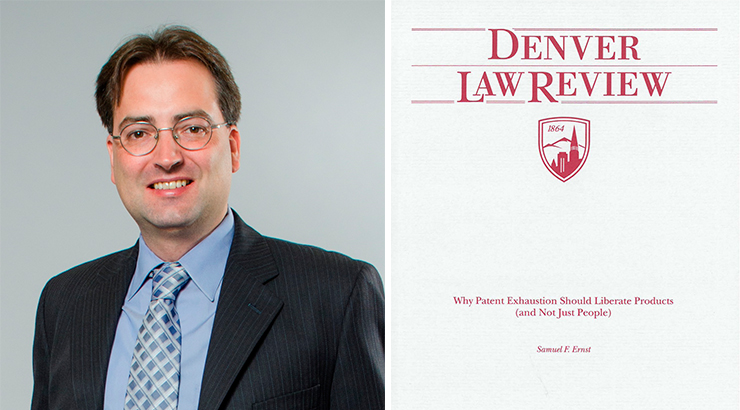
Fowler Law Professor Sam Ernst Published in Denver Law Review
October 21, 2016
Chapman University Dale E. Fowler School of Law Professor Sam Ernst’s article “Why Patent Exhaustion Should Liberate Products (and Not Just People)” was recently published in Volume 93, Number 4 of the Denver Law Review.
From the abstract:
Patent exhaustion is a doctrine that excuses infringement where the patent holder has either authorized the sale of a patented item or licensed its use or sale. Absent an effective contractual restriction, the patent holder’s rights in the patented item are exhausted and the patent holder cannot sue for infringement based on further use or resale of the item. This article explores the question of whether patent exhaustion adheres in the patented device, or if it is a defensive doctrine that only adheres to the benefit of particular parties. Traditionally, the courts have articulated the doctrine as liberating the accused product from patent rights, allowing it to pass through the stream of commerce to subsequent users with all rights exhausted. With respect to actual holdings, however, the Federal Circuit recently concluded that exhaustion has only excused infringement in the case law where the claim of infringement was against an “authorized acquirer” of the device, or against a party accused of inducing or contributing to the infringement of such an authorized acquirer. Apparently, a third party can be liable for infringement by unwittingly taking action that facilitates the end user’s use of the device for its intended purpose, even if the device is licensed to perform that function.
This article argues that the exhaustion doctrine should not be limited to shielding authorized acquirers of a patented device or any other particular classes of persons. The Supreme Court has never pronounced such a limitation on the doctrine. The Court has consistently characterized exhaustion as adhering in the patented device itself, allowing it to pass unimpeded through the stream of commerce to be used for its intended purpose.
A conception of patent exhaustion as adhering in the patented device is supported by all of the policy theories that have been used to justify the doctrine. The exhaustion doctrine has traditionally been justified by: (1) the policy against restraints on alienation of servitudes and (2) a policy to retain the balance between the need to encourage invention and the harm of a limited monopoly by ensuring that the inventor does not receive double recovery for the value of the patented invention. Recently scholars have argued that the patent exhaustion doctrine serves a third purpose: to guard the domain of the federal patent law, such that it does not interfere with the general commercial law of contracts. In fact, the Supreme Court has long embraced all three theories as supporting patent exhaustion.
Moreover, all three theories support a concept of patent exhaustion as adhering in the patented device. If the purpose of the exhaustion doctrine is to police the domain of intellectual property statutes, such that they do not interfere with commercial law, then the ability of patent holders to police the use of downstream goods is properly limited by contract law rules such as privity of contract and unconscionability. Patent rights must be exhausted to avoid interference with those laws. If the exhaustion doctrine is justified by the related statutory domain policy against overcompensation for patent holders for the use of their patented inventions, then third parties should not be charged for interacting with patented devices for which the patent holders have already received market-based compensation. If the exhaustion doctrine is justified by the common law policy against restraints on alienation of chattels, then exhaustion adheres in the patented goods, such that they may move down the stream of commerce unimpeded with restrictions on their lawful and intended uses.
Professor Ernst’s scholarship focuses on patent law, and he teaches in the areas of intellectual property, contracts, and civil litigation practice. Prior to joining the Fowler School of Law in 2013, Professor Ernst was a partner at the international law firm of Covington & Burling in San Francisco, practicing intellectual property, commercial, and appellate litigation, while maintaining an active pro bono practice focusing on veterans disability recovery and homeless advocacy. In 2010, Professor Ernst was recognized by the Federal Circuit Bar Association for his work on behalf of veterans. In 2006 and 2008, he received a Certificate of Excellence from the Berkeley Food and Housing Project. Prior to joining the Fowler School of Law Professor Ernst taught pre-trial civil litigation at the UC Berkeley School of Law. Professor Ernst earned his JD magna cum laude from Georgetown University Law Center. He has a B.A. in Modern Literary Studies from UC Santa Cruz and an M.A. in Comparative Literature from UCLA. Other recent articles include “Protecting the Boundaries: Unclaimed Consideration in the Patentee’s Social Contract,” Tulane Journal of Technology and Intellectual Property (forthcoming); “The Lost Precedent of the Reverse Doctrine of Equivalents,” Vanderbilt Journal of Entertainment & Technology Law (2016); and “Patent Exhaustion for the Exhausted Defendant: Should Parties be Able to Contract Around Exhaustion in Settling Patent Litigation,” Journal of Law, Technology & Policy (2014).
